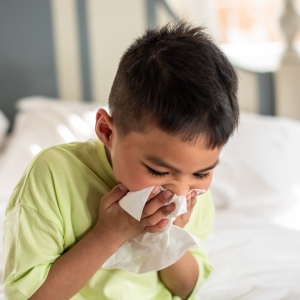Samaritan Health Services: Know When to Seek Care for Colds & Flu
This week we are sharing an article from Samaritan Health Services, originally published 12/02/2022.
A variety of respiratory viruses are making a comeback this winter as pandemic precautions have eased. Colds, influenza and respiratory syncytial virus (known as RSV) are no longer taking a back seat to COVID-19.
 “We are seeing a tsunami of flu and flu-like illness, with the state’s pediatric ICU beds filled to near capacity at what is generally the very beginning of flu season,” said Robert Farrell, MD, emergency physician and medical director of the Samaritan Pacific Communities Hospital Emergency Department. “A severe flu season is happening, atop an ongoing COVID-19 pandemic, atop RSV.
“We are seeing a tsunami of flu and flu-like illness, with the state’s pediatric ICU beds filled to near capacity at what is generally the very beginning of flu season,” said Robert Farrell, MD, emergency physician and medical director of the Samaritan Pacific Communities Hospital Emergency Department. “A severe flu season is happening, atop an ongoing COVID-19 pandemic, atop RSV.
Anxiety in the wake of the coronavirus pandemic also plays a role, said Dr. Farrell.
It’s completely understandable, after three years of the COVID-19 pandemic, that people are worried they or their children may have a dangerous infection and need immediate medical attention,” said Dr. Farrell. “But it’s important to realize that most of the time, these are the normal viral infections we’ve dealt with all our lives, and we all know what to do. Often, the fever, chills, runny noses and sore throats, while they can be extremely uncomfortable, aren’t dangerous and are best cared for at home with rest, fluids and over-the-counter medicines for pain or fever.”
If you or a loved one has symptoms of any respiratory illness – a cold, flu, COVID-19 or RSV – remember the following guidelines:
- If symptoms are mild, stay home.
- Help manage symptoms with proper nutrition, hydration and rest.
- Use over-the-counter medicine such as acetaminophen or ibuprofen to manage fever and pain. Never give aspirin to children.
Your pharmacist is often a great resource for guidance on over-the-counter medications.
When to Seek Care

How do you know when to call the doctor or make an appointment? Should you go to the urgent care or emergency department?
If you or your child is having difficulty breathing or breathing very quickly, is severely dehydrated, has fainted or has a fever above 105 degrees, seek care immediately at an emergency department.
If you or your child experience the following symptoms, call your primary care provider for an appointment, visit a walk-in clinic, schedule a telemedicine appointment (often offered by health insurance plans) or do a MyChart E-Visit:
- Fever that does not respond to fluids, rest and fever-reducing medications.
- Extreme fatigue.
- Inconsolable irritability (in young children).
- Confusion.
- Headache that does not go away.
- Chest pain.
- Labored breathing and a persistent cough.
- Neck stiffness.
- Stomach pain.
- Vomiting and dehydration (decreased urination and no tears when crying).
- Back pain.
- Weak legs or feet.
- Severe muscle pain.
“In emergency medicine, our door is always open. It’s an important part of our values and identity as emergency care providers,” Dr. Farrell said. “However, we have very limited tools to treat non-life-threatening upper respiratory infections. Because of the volume of viral respiratory cases coming in to our EDs and urgent cares, a person can wait for hours to see a doctor only to be given advice they probably remember from childhood – rest, hydrate, take acetaminophen or ibuprofen for pain or fever. This is understandably frustrating to people who have waited a long time, sometimes with a sick child in tow, but we have no secret advice or antibiotic-like medicine to cure colds or the flu.”
Dr. Farrell noted that for some patients, if started early, Tamiflu can shorten the course of an influenza infection, usually by less than a day, and patients at high risk of severe disease who’ve tested positive for COVID-19 should ask their doctor or pharmacist about Paxlovid.
 “But most of what we are seeing right now is influenza and colds, and there is very little we can do for that,” he said.
“But most of what we are seeing right now is influenza and colds, and there is very little we can do for that,” he said.
Employers and educators, Dr. Farrell says, also have a role to play.
If your employees or students have to miss work or school, please do not require a doctor’s note that will force them to seek immediate attention in an urgent care or ED,” he said. “These unnecessary visits place further strain on our already severely strained emergency departments, urgent cares and clinics.”
Learn more about some of the respiratory ailments going around from the Centers for Disease Control and Prevention: